
Discover the best Employer of Record (EOR) services for startups in 2025. Compare providers like Remote, Deel, Remunance, Oyster, Rippling & more with pricing, strengths, and strategic use cases for global hiring.

Discover the best Employer of Record (EOR) services for startups in 2025. Compare providers like Remote, Deel, Remunance, Oyster, Rippling & more with pricing, strengths, and strategic use cases for global hiring.

More remote talent is available now. This has sped up how fast startups grow in different countries. Managing cross-border hiring, compliance, payroll, and legal structures can be tricky. It can distract from key tasks, raise costs, and lead to regulatory delays. Employer of Record (EOR) services play a key role. They help startups build teams worldwide. This can be done without creating local legal entities.
The market in 2025 offers a wide spectrum of EOR providers. Some companies focus on quick growth and low costs. Others offer more value with compliance management, automation, and customized employee benefits. We created a detailed comparison to help startup leaders, founders, and finance teams. This assessment looks at the top EORs based on cost, coverage, and how well they align with scaling teams.
Provider | Ideal For | Countries Covered | EOR Pricing (Monthly) | Contractor Pricing | Key Strengths |
Remote | Remote-first teams | 180+ | $599 | $29 | Owned-entity model, IP protection, transparent pricing |
India-focused, cost-efficient hiring | India only | $99–$249 | Custom | Local expertise, fixed pricing, Indian compliance excellence | |
Deel | High-growth startups | 150+ | $599 | $49 | Fast onboarding, equity support, deep integrations |
RemoFirst | Budget-sensitive startups | 170+ | $199 | $29 | Lowest pricing, 24/7 support, essential EOR functions |
Oyster | Teams spread across jurisdictions | 180+ | From $499 | $29 | Scalable solution, detailed country-level compliance support |
Rippling | Tech-heavy, automation-first teams | 185+ | Custom | $8 | End-to-end HR-IT automation, robust integrations |
Atlas HXM | Custom compliance-heavy cases | 160+ | Custom | Custom | Risk mitigation, tailored contracts, HR consulting |
Multiplier | APAC-focused scaling | 150+ | From $300 | $40 | Customer-centric delivery, good mobile accessibility |
Papaya Global | Regulatory-heavy startups | 160+ | From $650 | $25 | AI-led compliance, deep analytics, immigration support |

Best for Remote-First Startups With Global IP Sensitivity
Remote is designed for startups that work globally. This is especially true for teams that operate online for their product and delivery. Remote stands out because it owns legal entities in more than 180 countries. This ownership lets it control hiring, provide benefits, and enforce intellectual property directly. Startups that prioritize data security, easy onboarding, and solid IP protection can gain from this model. It cuts out the need for third-party local providers. This change helps close compliance gaps and lowers legal risks.
The platform is attractive because of its flat-rate pricing. It costs $599 per employee each month. There are no hidden fees or country-based price changes. Remote is great for finance teams that want to hire in multiple countries and manage costs effectively. You can add more services to the stack, like contractor management for $29 a month. There’s also a global payroll add-on for companies that own entities.
Remote offers localized benefits, employment contracts, background checks, and time-off tracking. It also includes Remote IP Guard, a unique tool. This tool adds IP clauses for each country to employment documents. This way, asset ownership stays protected.
Remote work works well for VC-funded companies that want to hire in talent-rich but risky areas. However, it is on the pricier side. It also lacks the deep customization that smaller companies may need. Plus, it has fewer reporting options than enterprise-grade platforms.
Remote offers strength, consistency, and legal clarity for startups. This is especially true for those with compliance needs and distributed teams. They also help with predictable global hiring at scale. However, there is a premium cost involved.

Best for Startups Hiring in India With Cost Efficiency and Local Compliance
Remunance is the most reliable EOR solution focused on India, and it has good reasons for this. It’s one of the few EOR providers that knows India’s tricky labor, tax, and compliance laws well. Startups wanting to build teams in India can use Remunance. This helps with payroll, statutory benefits, HR documents, and compliance with Indian labor law. Plus, it costs much less than the global average for EOR services.
Pricing for full-time employees is between $99 and $249 per month. This makes it one of the most affordable EOR solutions globally. No setup fees or lock-in periods exist. All standard compliance parts are included in the fixed pricing. This covers PF, ESIC, income tax deductions, and leave administration. Startups using India as a delivery hub can save a lot compared to international providers with flat global fees.
Remunance stands out because of its India-first operational structure. It combines HR, legal, and payroll under one roof. Remunance is different from global tools. Remunance is designed from the start to meet India’s regulatory needs, while other tools focus on compliance after scaling. This means faster onboarding, quicker dispute resolution, local benefits, and real-time law updates.
Startups using Remunance often fall into two categories:
Remunance is India-only and doesn’t cover multiple countries. It’s great at one thing: hiring full-time Indian employees fast, cheaply, and legally, no subsidiary registration required.
For startups wanting to test or grow in India, Remunance offers a safe and compliant way to enter the talent market. It helps maintain control, lower PE risk, and reduce HR costs.

Best for High-Growth Startups Scaling Across Multiple Geographies
Deel is one of the fastest-growing EOR platforms. It has expanded globally, rolled out products quickly, and offers a user-friendly design. Deel is designed for fast-growing startups that hire widely across the globe. It focuses on speed, compliance, and easy self-service. This makes it especially useful for small HR teams managing workers in different time zones.
The platform is available in over 150 countries. It charges $599 per employee each month for EOR services and $49 monthly for contractors. This pricing is a bit higher than the budget provider, but it fits well for venture-backed startups. Deel has many strong features. These include automated payroll in over 120 currencies. It also offers localized contract generation, benefits administration, and expense reimbursements. Additionally, Deel provides visa sponsorship and global equity support.
Deel works well for scaling teams because it executes quickly. Onboarding usually takes just a few days. Also, its approach helps startups turn contractors into employees safely. This way, independent consultants can smoothly transition to full-time roles. It also offers a mobile app, in-app chat, and built-in time tracking. Plus, it integrates with key systems like BambooHR, QuickBooks, and Greenhouse. This helps reduce the HR workload.
For early-stage or bootstrapped startups, Deel’s high pricing might not be attractive. This is especially true when you compare it to options like RemoFirst or Remunance. Some companies need deep customization or special benefits. They may find Deel’s templates too limited unless they upgrade.
Deel is ideal for funded companies. It offers quick global access. You can hire contractors and employees from various locations. Deel helps startups move quickly toward Series B and beyond. They provide speed, compliance support, and a wide range of infrastructure.
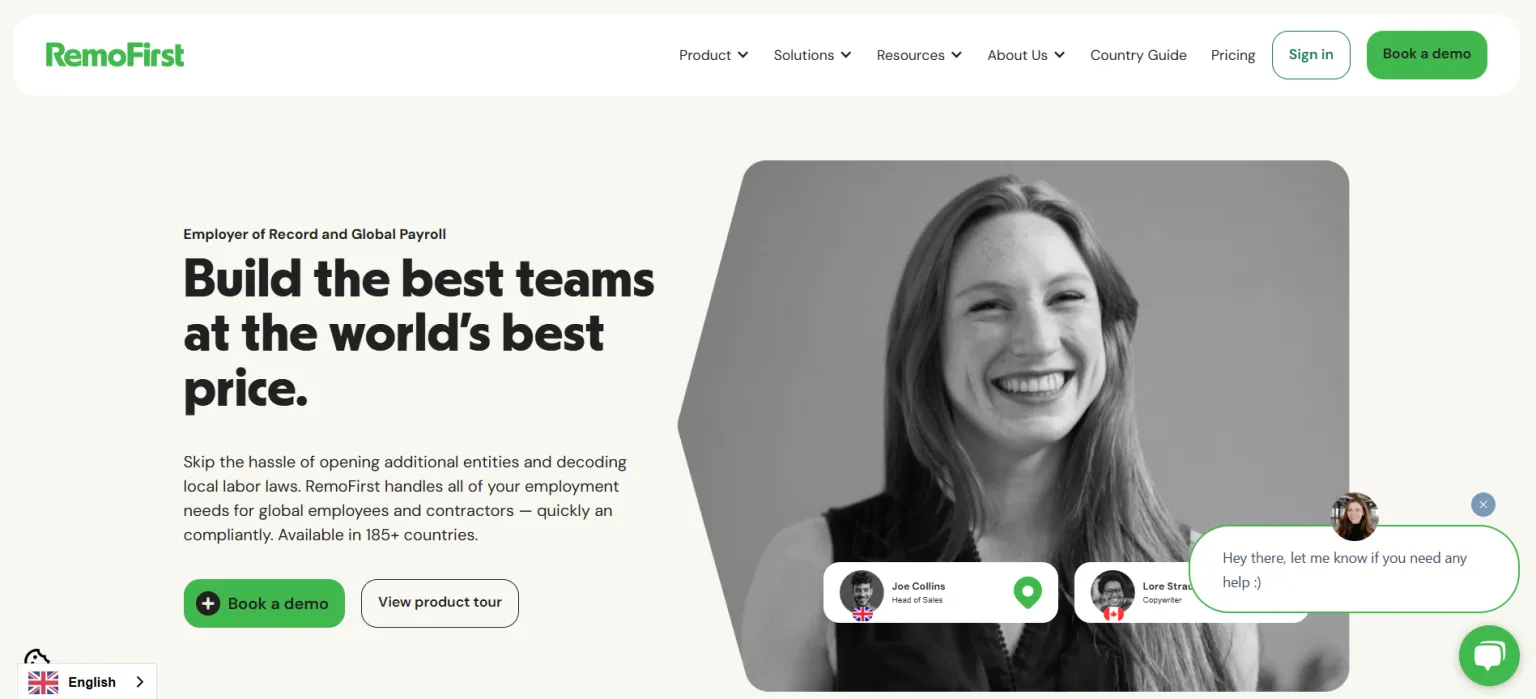
Best for Budget-Conscious Startups Prioritizing Core Compliance
RemoFirst joined the EOR market as a price disruptor. It still has the title of the most affordable EOR provider at scale. RemoFirst starts at $199 per employee each month. It’s perfect for startups that are bootstrapped or in early fundraising. Even with limited funds, you can onboard full-time international hires compliantly.
The provider supports clients in over 170 countries. It doesn’t use an owned-entity model like Remote or Deel. Instead, it keeps costs down by focusing on key services. These items are payroll, tax withholdings, local employment contracts, basic benefits, and tracking time off. Contractor hiring is available at $29/month.
RemoFirst has a clear value proposition. It avoids bundling add-ons or spending too much on a fancy dashboard. Instead, it focuses on providing compliant employment structures without extra features. Startups that must meet investor deadlines or ship fast with remote teams get a clear entry point. This option comes with no legal risks.
Startups needing integrations, advanced analytics, or deep HR customization may hit limits with the platform. The UI is simple but not as intuitive as Deel or Rippling, and there is no mobile app or deep workflow automation. RemoFirst helps organizations save money while ensuring payroll accuracy and legal compliance.
It’s usually the top pick for companies testing temporary hires in new markets. This is especially true for building tech and support teams in LATAM, SEA, and Eastern Europe.
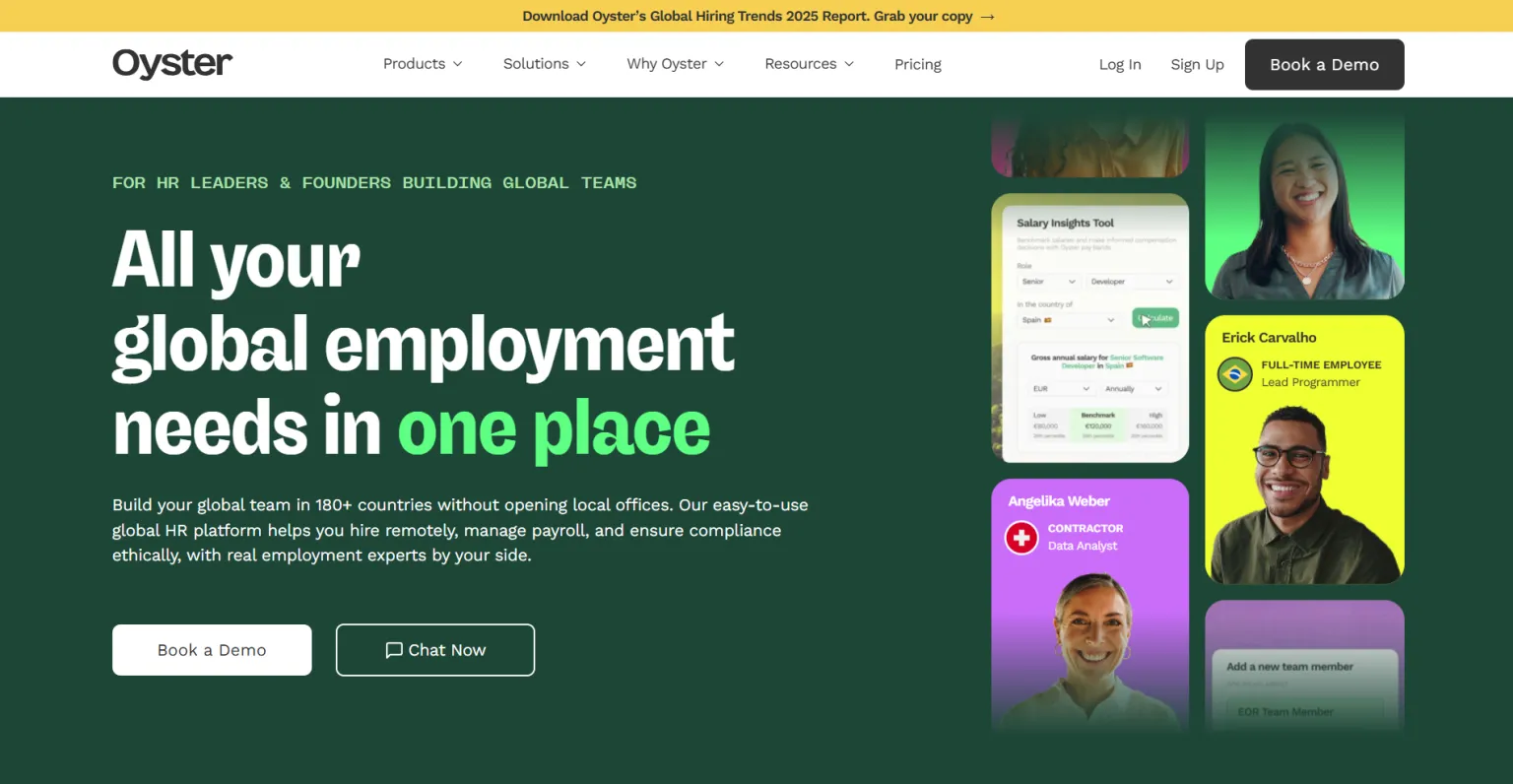
Best for Startups Managing Distributed Teams Across Jurisdictions
Oyster has a clear goal: to help startups hire easily in over 180 countries. They do this without needing local entities or dealing with messy compliance systems. Oyster stands out because of its deep country-level knowledge. Its localized guides and built-in legal frameworks make hiring easier in places with tricky labor rules.
The pricing is tiered:
Oyster provides a full employment stack. It includes:
This makes managing international employees easier.
The strength comes from its compliance engine, which is well integrated into the platform. This helps startup HR teams scale into new areas without needing constant legal advice.
Oyster shines with its focus on scalability and legal clarity. This makes it perfect for Series A or B startups that want to expand into multiple regions at once. Its reporting features are better than lighter tools like RemoFirst. It also offers detailed audit logs and documentation workflows.
The platform is not without limitations. For startups focused on pricing efficiency, Oyster’s per-seat rate may be difficult to absorb. Its UI is clean, but it lacks the extensibility of platforms like Rippling or Deel. It doesn’t offer advanced integrations or embedded equity tools.
Oyster provides a balance of structure, automation, and country-specific detail. This helps you expand into new countries. You can do this without overlap and still meet compliance needs. Few platforms can match this level of support.

Best for Tech-Heavy Startups Requiring End-to-End HR and IT Automation
Rippling goes beyond traditional EORs. It offers a multi-layered platform that combines HR, IT, finance, and global employment into one system. This is great for startups that want to centralize everything. They can manage onboarding, payroll, device provisioning, and access control all in one dashboard.
Its pricing is modular. Base HRIS begins at $8/user/month, with EOR and payroll features priced on request. Rippling offers EOR in over 185 countries. It uses a partner network and its own infrastructure. The service includes device management, app access, role-based permissions, and custom workflow triggers.
Rippling stands out because of its automation. The Unity platform allows detailed control over workflows. Hiring a developer in Brazil can trigger several actions. It can start laptop shipment, grant Slack access, set up payroll, and manage compliance documents. This all happens without any manual work. For CTO-led orgs or ops-heavy teams, this reduces headcount dependency in HR and IT.
However, Rippling’s sophistication comes with a learning curve. Smaller teams may find the platform overbuilt relative to their needs. It’s one of the pricier options when you add in core modules. This might not work for startups with fewer than 20 employees or those with limited growth plans.
Rippling is best seen not as an EOR in isolation but as a comprehensive employee operating system. Rippling offers strong support for product-led companies. It helps them manage global operations, security, and complex infrastructure. However, it requires a solid budget and operational maturity.
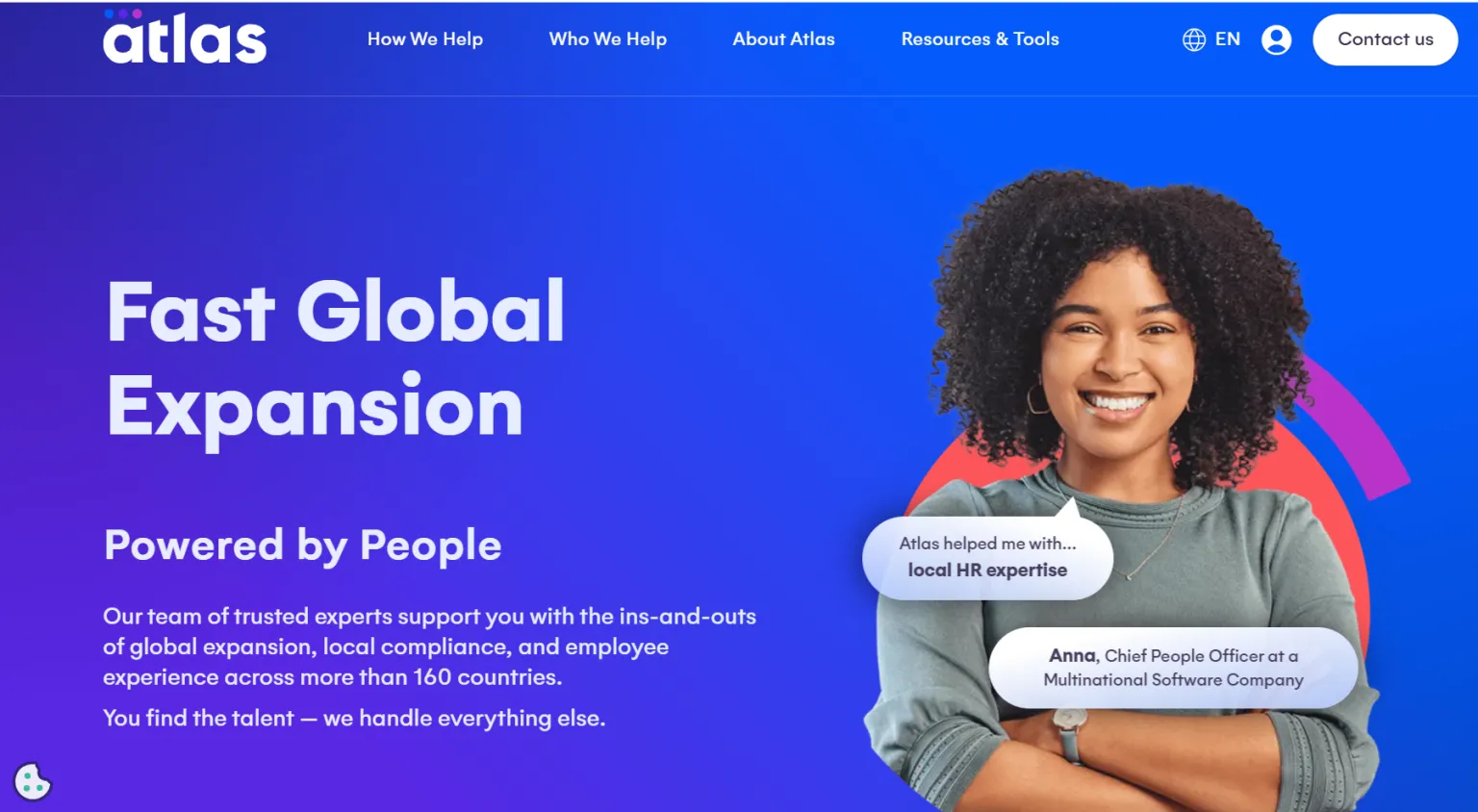
Best for Startups With Complex Compliance and Customization Requirements
Atlas, once called Elements Global Services, helps startups with unique employment setups. These setups often face higher compliance risks or operate in unpredictable labor markets. Atlas stands out from most EORs. While many use a product-led model, Atlas takes a consultative and customizable approach. They provide tailored solutions for startups that have complex onboarding needs.
Coverage spans 160+ countries, with pricing available only on request. Atlas often uses two pricing models for long-term agreements in various countries. These are the payroll percentage model and retainer pricing. The cost may be higher than SaaS-style EORs, but it reflects the hands-on risk management and legal interpretation provided.
Atlas is defined by its direct EOR model. It owns legal entities in several countries. Plus, it supports this with in-house HR, legal, and compliance experts. Its proprietary HXM (Human Experience Management) platform combines global payroll, immigration support, equity management, time tracking, analytics, and visa processing. It also lets startups adopt modules based on their specific needs.
Startups in regulated fields like fintech, pharma, or cybersecurity often pick Atlas. They aim to lower regulatory risks, particularly in Africa, Southeast Asia, and the Middle East. The platform excels at managing shadow payroll, work visa tasks, and inter-company contracts. This gives it an advantage over self-serve EOR tools.
However, Atlas comes with trade-offs. The platform lacks the agility of modern SaaS tools and requires more onboarding time. The UI works, but it lacks style. Real-time teamwork between teams and Atlas consultants is key to staying aligned.
For startups entering complex markets with unique job laws, Atlas offers more than coverage. It gives legal protection and a solid framework. But that depth comes at a price, both financially and operationally.
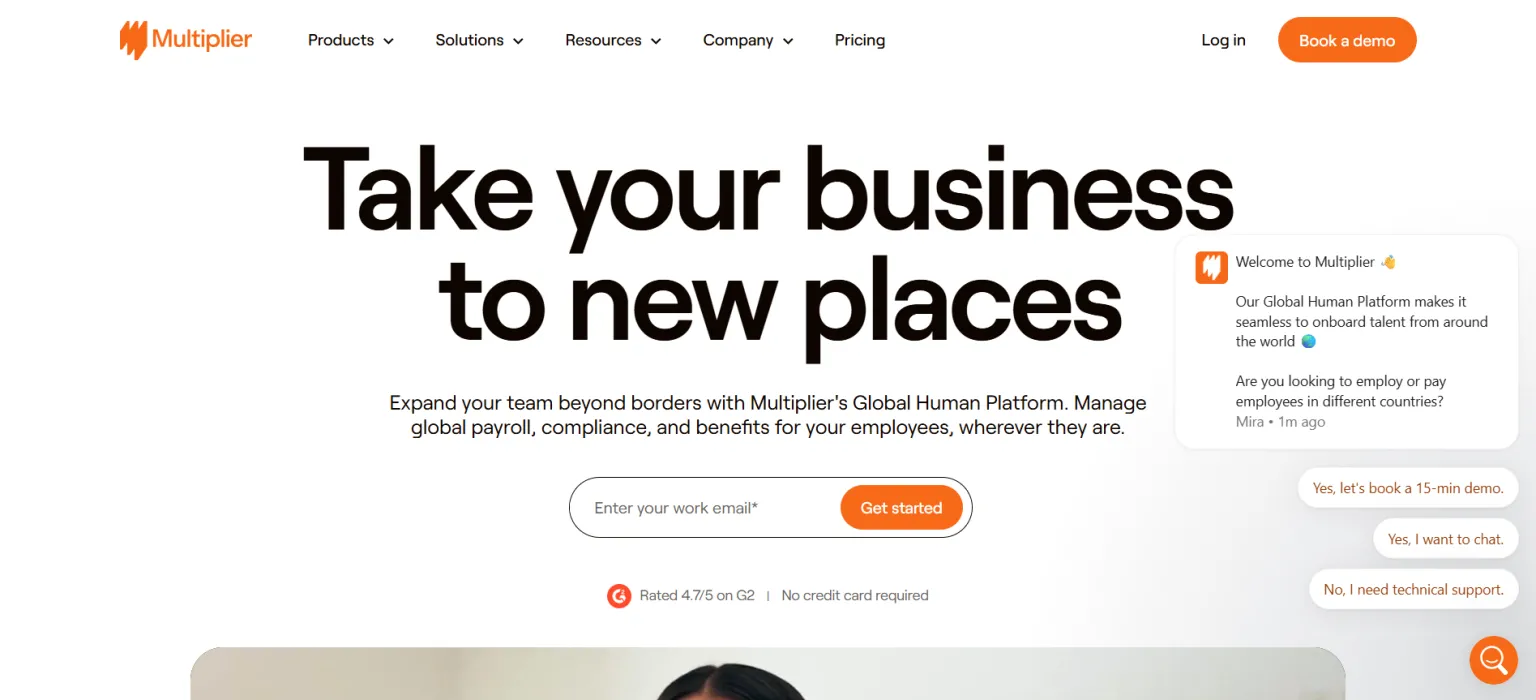
Best for Startups Prioritizing Service, Simplicity, and APAC Coverage
Multiplier provides a user-friendly platform focused on Asia-Pacific markets. It features quick onboarding, responsive support, and clear, fixed pricing. It’s perfect for startups moving into India, Singapore, Indonesia, Vietnam, and Malaysia. It’s great for people who want direct customer support and an easy-to-use platform.
Multiplier covers over 150 countries. EOR services start at $300 to $400 per employee each month. Contractor services are available for $40 a month. The offering includes standard EOR features: compliant contracts, localized benefits, expense tracking, and payroll. Visa and relocation support are available upon request.
The platform strikes a balance between affordability and functionality. The UI is simple and intuitive, even for startups without a dedicated HR team, and onboarding cycles are shorter than average. Multiplier stands out because of its onboarding managers. They understand country-specific details and help companies new to international employment.
It may lack depth compared to Rippling or Deel. But it makes up for that with clear guidance. This is especially helpful for early-stage founders without legal or payroll teams. However, it offers fewer integrations, basic reporting, and does not support deep automation.
Multiplier suits startups with small teams in talent-rich APAC markets. It helps them move quickly, stay compliant, and keep personal connections with onboarding staff. This is better than dealing with impersonal software.
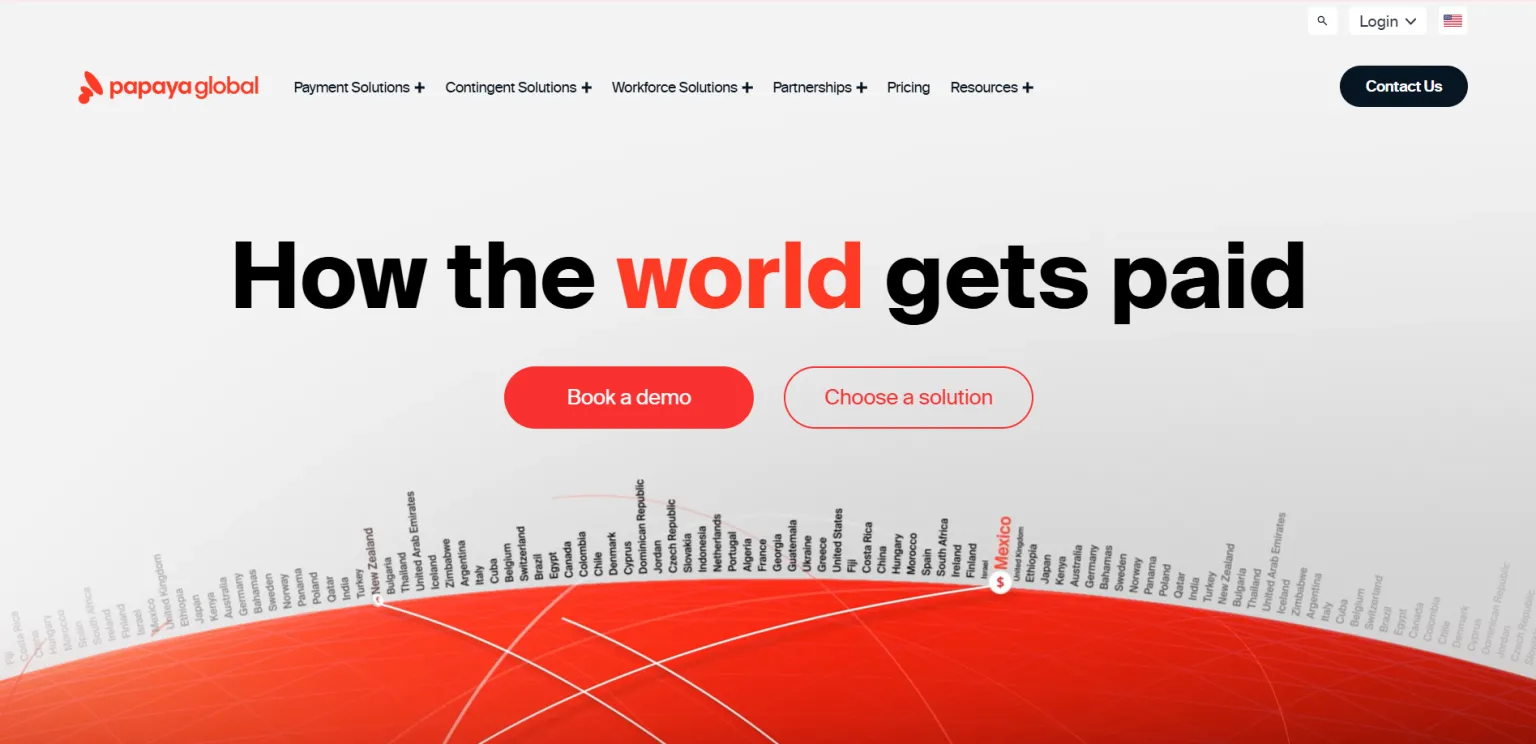
Best for Startups in Regulatory-Heavy Sectors and High-Risk Regions
Papaya Global takes a compliance-first approach to global employment. This makes it a great choice for startups in regulated industries or those hiring in countries with complex laws. The platform works in over 160 countries. Pricing starts at $650 per employee each month. Contractor management costs $25 per month. This makes it a premium EOR provider.
Papaya’s AI-driven compliance engine is the key value driver. It watches local labor laws closely. Then, it applies the right rules to hiring, contracts, tax deductions, and benefits structuring. The platform offers a complete payroll system. It also includes immigration support, time tracking, benefits management, equity reporting, and advanced workforce analytics, all in one place.
Papaya works well with enterprise platforms like Workday and SAP. This makes it a good choice for startups moving to mid-size or enterprise scale. In high-risk countries like Brazil, China, or South Africa, people often prefer Papaya. This is because of its clear onboarding audits, PE risk avoidance, and employment frameworks that fit the region.
Where it falls short is in price and onboarding simplicity. The learning curve is steeper, and smaller teams might find the platform over-engineered. For sectors like healthtech, edtech, or SaaS with government clients, Papaya offers compliance clarity and audit readiness. These features are tough to replicate.
Let’s dive into a real-world example that perfectly illustrates how strategic EOR implementation can be a game-changer for ambitious startups. Meet TechNova, a San Francisco-based AI software startup that dreamed of building a world-class development team without getting bogged down by complex international employment challenges.
TechNova faced a common startup dilemma: they wanted to hire top-tier software engineers from India, but the administrative hurdles seemed insurmountable. Traditional approaches would have required:
Enter a strategic partnership with an innovative EOR service provider. By leveraging comprehensive international employment solutions, TechNova transformed its global hiring strategy from a potential nightmare into a seamless operation.
The chosen EOR partner provided end-to-end support that went far beyond traditional employment outsourcing. They offered:
“With our EOR partner, we went from concept to a fully functional international team in weeks, not months. It was like having a global HR department without the overhead.” – Sarah Chen, TechNova’s Founder.
Within six months of implementing its EOR strategy, TechNova achieved what would have taken years through traditional methods:
Their success story isn’t unique. As the North American EOR market continues to expand, more startups are discovering that strategic workforce management isn’t just about hiring—it’s about building global ecosystems that drive innovation and growth.
TechNova’s journey demonstrates that with the right global workforce solutions, startups can transcend geographical limitations and tap into world-class talent without getting lost in bureaucratic labyrinths.
Selecting an Employer of Record is not just about ticking off features or scanning pricing grids. It’s a choice that connects growth, compliance, finance, and long-term efficiency. Most providers have similar service categories, like onboarding, payroll, and compliance. However, they vary in delivery models, ownership structure, regional expertise, and pricing transparency. And that’s where alignment with the startup context becomes critical.
The first step is to map the expansion intent. This might mean focusing on one big market, like India, or expanding operations in Europe and Southeast Asia. After understanding the geography, think about operational maturity. Does the startup have its own HR or legal team? Or does it need a hands-on partner to manage everything from start to finish?
Providers like Remunance are ideal for a strong presence in one key area, like India, at the best cost. Startups that want quick market testing in over 5 countries can benefit from Oyster or Deel. They offer easy country playbooks and consistent workflows.
Cost should be considered holistically, not just per-seat pricing, but value across five layers:
Many early-stage startups make a big mistake. They often overpay for global coverage they don’t actually need. Some even choose the cheapest provider without checking for legal compliance. Growth-mode startups should choose EORs that fit their size, not ones that are too complex. They need platforms that fit their current team. These platforms should also grow as their headcount or locations change.
The inflection point where EORs become a superior strategy is typically when a company needs to:
A US-based SaaS startup can access India’s support talent easily. It doesn’t need to register a company. There’s no need for GST and PAN documentation or setting up an EPFO account. Instead, it can use Remunance to onboard its first three support agents in a week. It can also provide competitive Indian benefits, stay compliant, and exit easily if market conditions change.
This flexibility and faster time-to-market can outweigh the higher monthly seat cost. This is true, especially if the EOR agreement avoids lock-ins and big upfront fees.
Scenario | EOR | Contractor | Local Entity |
Hire 1–10 FTEs abroad | Ideal | Risk of misclassification | Expensive setup |
Enter the market in under 30 days | Quickest | Quick | 3–6 months timeline |
Need full benefits and equity compliance | Compliant | Not feasible | Full support |
Want to test new markets with minimal risk | Low commitment | Flexible | Not cost-efficient |
Complex regulated markets (e.g., Brazil, India) | With the right partner | High compliance risk | If long-term presence |
Scale 50+ people in-country | Can become cost-heavy | Unsustainable | Cost-effective long-term |
In most early-stage or test-phase situations, EOR excels in cost, flexibility, and legal protection. It works best when used wisely as a step toward setting up a local entity.
India remains a top choice for startups wanting to build offshore teams. It provides cost savings and access to skilled, English-speaking workers. This includes fields like engineering, operations, sales support, and finance.
But hiring in India through a global EOR can be expensive and inefficient. Providers like Remote or Deel have the same prices everywhere. This means you might pay $599 a month for each employee in India, even though the costs for payroll and other legal requirements are much lower.
This is where Remunance brings a distinct advantage. Our fixed pricing starts at $99 a month. We provide India-first legal support and include necessary frameworks like PF, ESIC, gratuity, and leave. This helps startups hire Indian talent while staying compliant and keeping costs low, with no extra fees.
For startups in India with 1–50 employees, Remunance offers the best cost-value balance:
This model helps international startups use India’s workforce. They can do this without facing legal challenges. So, it stands out as a key EOR deployment worldwide.
EOR providers often promote flat monthly pricing. However, the true cost structure may have hidden variables. These can increase the total cost of ownership (TCO) over time. Startups should not just focus on the seat price. They need to check clauses, exclusions, and any region-specific surcharges. These factors can lead to unexpected cash flow issues.
Here are the most common hidden cost categories:
Hidden Cost Type | Impact Description |
Early Termination Charges | Applied when contracts are ended before a defined term. Common in annual agreements. |
Currency Conversion Fees | Up to 3–5% markup on FX rates, especially when invoicing in USD but paying locally. |
Onboarding/Admin Costs | One-time setup charges for processing documents, issuing contracts, etc. |
Compliance Penalties | Retroactive penalties due to delayed filings or classification errors. |
Mandatory Bonuses | Statutory bonuses in regions like India or Brazil that may be billed separately. |
Custom Integrations | Non-standard tech integrations or data exports billed as professional services. |
Visa/Relocation Charges | Added when EORs assist with sponsored immigration or relocation support. |
Startups should always demand a fully itemized quote, especially when scaling into more than one country. Providers like Remunance have no FX markups and fixed per-seat pricing. This makes it easier to forecast and budget. Platforms like Deel or Remote need careful contract reviews. This helps catch optional services that auto-renew or activate after a usage limit.
Not all high-cost EORs are overpriced. In many cases, the added cost covers structural liabilities that the startup would otherwise carry internally. Here’s how to distinguish cost from waste:
In short, cost is justified when the EOR reduces your operational burden, de-risks legal exposure, or accelerates delivery. However, the line between overengineering and high-value protection depends on the startup’s scale, geography, and funding stage.
For example, a 5-member team in India does not need a global EOR with GDPR, ISO 27001, and SOC2 certifications. But a 15-member setup spanning the EU and APAC almost certainly does.
Global hiring is not just a goal for the future. It’s a key strategy for every startup in 2025. EORs make this shift operationally viable. But only when chosen carefully, deployed in the right phase, and sized for the right use case.
Remunance, for India-based hiring, offers unmatched value. Remote and Deel simplify distributed team hiring for well-funded startups. Oyster, Papaya, and Atlas serve best when compliance complexity is non-negotiable. Rippling leads when scale demands more than HR. And for price-sensitive expansion? RemoFirst and Multiplier unlock global reach without financial overreach.
The key point is not which EOR is “best.” Instead, it’s about which one fits the startup’s location, budget, risk level, and hiring plans.
As teams expand internationally, the right EOR can speed up onboarding. It can also improve hiring, ensure better compliance, and provide a scalable global infrastructure. For founders, balancing urgency with precision is key. This alignment is not just helpful; it’s a tool for gaining long-term advantage.
The 30 Best HR Software Solutions for 2025 (Reviewed & Compared)
Explore the top 30 HR software solutions of 2025. Compare payroll, hiring, and compliance tools to choose the best HR platform for your business needs.
Peorient is your independent EOR & PEO advisor, helping businesses hire globally, stay compliant, and grow faster.
Copyright © 2025. All Rights Reserved
Website security powered by MilesWeb